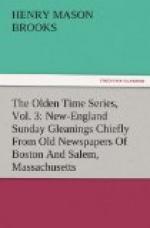An eminent writer has said: “We live in a transition period, when the old faiths which comforted nations, and not only so, but made nations, seem to have spent their force.... There is faith in chemistry, in meat and wine, in wealth, in machinery, in the steam-engine, galvanic battery, turbine-wheels, sewing-machines, and in public opinion; but not in divine causes.... A silent revolution has loosed the tension of the old religious sects, and in place of the gravity and permanence of those societies of opinion, they run into freak and extravagance.... In creeds never was such levity: witness the heathenisms in Christianity,—the periodic revivals, the millennium mathematics, the peacock ritualism, the retrogression to popery, the maundering of Mormons, the squalor of mesmerism, the deliration of rappings, the rat-and-mouse revelation, thumps in table-drawers, and black art ... By the irresistible maturing of the general mind the Christian traditions have lost their hold.”
If these statements are true, we have a sufficient answer to the question so often asked: “Why do not people go to church as they once did?” They do not go because they have lost their faith in churches and worship,—at least such have as are appealed to from those holding liberal and reasonable views. There are no doubt men who consider the too often expensive ways in which churches are supported as altogether beyond their means. The demands of civilization upon individuals in these restless times, when there are so many organizations, secret, secular, and religious, are indeed too great for small incomes, especially as the cost of food is continually increasing, and as society in other ways makes so many secular demands upon them. Public worship is after all, in the view of many persons, not a necessity, but only a luxury which can easily be dispensed with. It might perhaps have been better for the whole community if churches had undertaken to do the work which is now in the hands of many charitable and secret societies; then those who take so much interest in these outside, often expensive, organizations would have had all their interest in the churches. But the latter were for years so divided on doctrines of belief that their whole attention has for the most part been directed to other matters than their legitimate work, which has thus been thrown into the hands of outside agencies. In these times it seems difficult to maintain religious societies except where the element of fear is dominant in the creed, where some remarkable preacher takes the attention, or where the ritual or fashion attracts. Do not the papers often speak of “fashionable” churches?




